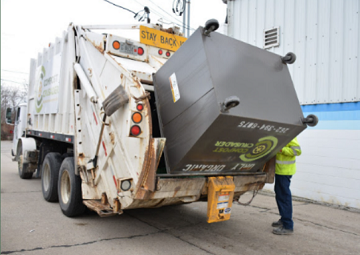
Baird Center community partner works to reduce southeastern Wisconsin’s food waste via composting
During the holiday season, it’s not uncommon for Milwaukee residents to see garbage and recycling bins filled to the brim with trash, Amazon boxes and uneaten leftovers from a recent gathering. According to the EPA, food waste makes up about 24% of the trash sent to our landfills. But luckily for Milwaukee, local businesses like Compost Crusader are working hard to change that. The St. Francis-based organization provides both residential and commercial services for those who are looking to help in the fight against climate change by composting like the Wisconsin Center District (WCD).
When WCD started its partnership with Compost Crusader in 2019, the first thing they did was work with the District’s food and beverage team to figure out Baird Center’s waste streams. This is a crucial first step in helping all their commercial clients develop a strategic composting plan.
“Are they prepping food fresh in the back? Is it more of a catering-style situation? Is it more of a breakroom-style situation?” Compost Crusader Operations Manager Robby Friedlen said.
From there, the team determines how many composting bins the business needs and develops a pickup schedule. Compost Crusader then takes care of collecting the bins and hauling them to a compost site. This simple and easy process reduces the strain we put on our landfills by reducing the amount of food we send there.
“By diverting food waste out of a landfill, we free up space in landfills for stuff that really has to go there,” Friedlen said.
Composting also reduces the amount of greenhouse gases produced in landfills, which by EPA estimates, is equal to the emissions from over 24 million gasoline-powered cars being driven for a year and turns food waste into a renewable resource.
“It’s a wonderful fertilizer, you can use it at home gardens, larger farm applications and even house plants.”
In the ten years since Compost Crusader started, the business has grown exponentially, helping residents and businesses across southeastern Wisconsin, including Baird Center, which has composted 86,230 pounds of food waste with Compost Crusader over the last five years.
Friedlen says having community partners like Baird Center increases the visibility of composting throughout the community.
“Everyone can do their part by composting at home, but these larger organizations are producing a lot more food waste,” Friedlen said.
In May, Baird Center expanded its composting program by installing an on-site food digester in Baird Center North Building’s Catering Kitchen in addition to its existing partnership with Compost Crusader. The ORCA food digester utilizes a natural, biological process to break down food waste before discharging it into normal plumbing infrastructure. Liquids discarded from the ORCA are further recycled at wastewater treatment plants where nutrients are extracted to create renewable fuel used for land application.
Since the ORCA was installed in May, Baird Center and its exclusive food and beverage provider, Levy Restaurants, have saved 32,604 net pounds of CO2 by composting.
That’s the equivalent of greenhouse gas emissions from:
- 2.74 average cars driven for one year.
- 4.18 tons of waste recycled instead of landfilled for one year.
- 31,593 miles driven by an average passenger vehicle.
It’s also equivalent to CO2 emissions from:
- 1,387 gallons of gasoline consumed in one year.
- 1.55 homes’ energy use for one year.
- 445 incandescent lamps switched to LEDs.
And equivalent to the weight of:
- 182 refrigerators.
- 13.4 compact cars.
- 4 elephants.
Baird Center is proud to work with organizations like Compost Crusader to accomplish a shared mission to make Milwaukee a greener community.